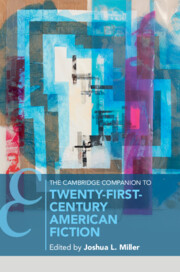Book contents
- The Cambridge Companion to Twenty-First-Century American Fiction
- The Cambridge Companion to Twenty-First-Century American Fiction
- Copyright page
- Contents
- Illustrations
- Contributors
- Acknowledgments
- Chronology
- Introduction
- Part I Forms
- Part II Approaches
- 6 Afro-Futurism/Afro-Pessimism
- 7 Transpacific Diasporas
- 8 Hemispheric Routes
- 9 Transgender and Transgenre Writing
- 10 Climate Fiction
- Part III Themes
- Further Reading
- Index
10 - Climate Fiction
from Part II - Approaches
Published online by Cambridge University Press: 02 September 2021
- The Cambridge Companion to Twenty-First-Century American Fiction
- The Cambridge Companion to Twenty-First-Century American Fiction
- Copyright page
- Contents
- Illustrations
- Contributors
- Acknowledgments
- Chronology
- Introduction
- Part I Forms
- Part II Approaches
- 6 Afro-Futurism/Afro-Pessimism
- 7 Transpacific Diasporas
- 8 Hemispheric Routes
- 9 Transgender and Transgenre Writing
- 10 Climate Fiction
- Part III Themes
- Further Reading
- Index
Summary
Heather Houser considers the conceptual frameworks of a topic that bears on nearly every other chapter in this Companion, contemporary “cli-fi” and ecocritical approaches to current literature. When writers presume transformational climate change as a starting point, rather than an abstract possibility, they narrate an “uncanny valley of familiarity and radical alteration” that extends, accelerates, or alters the logics of the present into near or distant futures of drought, warfare, destitution, and superstorms.
Keywords
- Type
- Chapter
- Information
- The Cambridge Companion to Twenty-First Century American Fiction , pp. 196 - 212Publisher: Cambridge University PressPrint publication year: 2021
- 3
- Cited by

